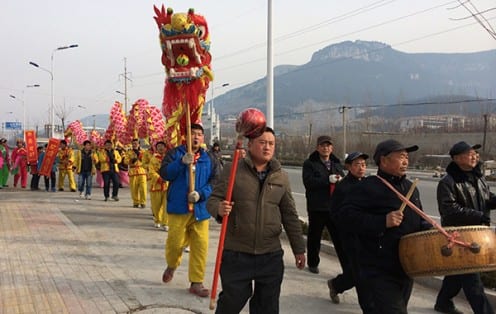‘Writing up’: social media, disconnection and writing ethnography
By Tom McDonald, on 26 October 2014

Villagers from the township taking part in a local festival (Photo: Tom McDonald)
Our entire team have now returned from the field and are already stuck into the process of turning our research into books, which we plan to publish in January 2016.
For me it’s an enormously strange to transition to go from the excitement of village life to the relative sedateness of a life spent largely in the company of Microsoft Word everyday.
You could be forgiven for thinking that living in a rural Chinese town would be a positively tranquil experience, but looking back on my 15 months of fieldwork in the town from afar, it all seems to condense into one single blur. My friends in the town seemed to always be unexpectedly arriving at my door, endlessly calling me on the phone, inviting me out to impromptu dinners, or for walks around the countryside, trips to places, or to join in at local events and festivals. By contrast, life in London is comparatively tranquil: with more time to finally concentrate on writing articles and publications, combined with the familiar rhythm of academic life in the department.
But it’s not that all my friends from the town have disappeared completely. My phone receives a constant trickle of messages from my friends in the town. Contrast this with the early days of anthropology, where leaving the fieldsite really meant leaving the fieldsite, and anthropologists would bid farewell to the tribe the had been studying in some far-flung corner of the world and had little expectation (or indeed way) of remaining in touch. Even if I wanted to cut myself of from my fieldsite, social media makes it difficult to do so. Keeping in touch with my participants and hearing from them the latest news about their lives, relationships, exam successes, etc., means that there is always more information to be added to the ethnographies, and also speaks volumes with regards how much social media is fundamentally changing the experience of anthropological fieldwork itself.
 Close
Close





